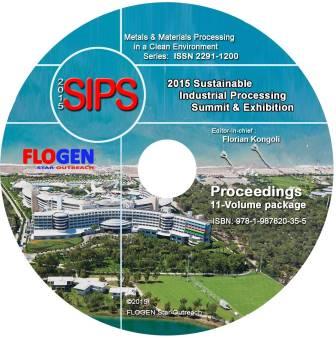2015-Sustainable Industrial Processing Summit
SIPS 2015 Volume 4: Meech Intl. Symp. / Mining Operations
| Editors: | Kongoli F, Veiga MM, Anderson C |
| Publisher: | Flogen Star OUTREACH |
| Publication date: | 23 December 2015 |
| Pages: | 275 pages |
| ISBN: | 978-1-987820-27-0 |
| ISSN: | 2291-1227 (Metals and Materials Processing in a Clean Environment Series) |

< CD shopping page
Perceptions of Small and Large Scale Mining in Tambogrande, Piura, Peru
Zarai Toledo Orozco1; Marcello Veiga2;1UNIVERSITY OF BRITISH COLUMBIA, Vancouver, Canada; 2UBC-MINING, Vancouver, Canada;
Type of Paper: Regular
Id Paper: 445
Topic: 4
Abstract:
Hand in hand with the great mining investment that has been taking place during the last 15 years, Peru has also witnessed the proliferation of artisanal mining. Paradoxically, the cities where artisanal mining has an important presence are also the ones that expressed strong opposition against large-scale mining. This is the case of the district of Tambogrande (Piura, Peru), which in 2002 showed strong opposition to the mining operations of a Canadian mining company. In its worst episode, this opposition led to a conflict that included massive protests, violence and deaths. Tambogrande became an emblematic case in Latin America of resistance to mining activities. Currently, the district is facing a fast proliferation of small and artisanal mining. The main objective of this proposal is to investigate why artisanal mining does not face the opposition that large-scale mining does, specifically, what are the social channels and beliefs that contribute to the continuity and support of small and artisanal mining in contrast to large scale mining.
Most of the work around this issue in Latin America has focused on the environmental and technical aspects of mining, however these approaches cannot explain why, being accused of the same claims, small-scale and artisanal mining does not generate the same local opposition that large-scale mining does. In that sense, this research emphasizes the relevance of having social license in order to assure the sustainability of any extractive operation. It argues that this is linked to how people perceive the impact and the contribution of mining activities, its expectations, and most importantly, how these activities are socially linked to their lives. The research uses interviews, ethnographies and a survey to test this hypothesis.
Key words: perceptions, socio-environmental conflicts, artisanal mining, social license